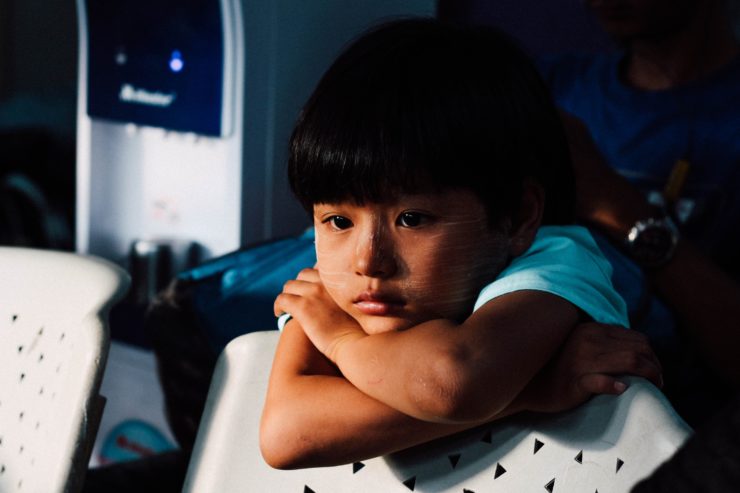Children hear the word death almost every day — on television, in the movies, and in the news. This does not mean that they understand what death means or are prepared for it when it touches their own lives. All of the media images can add to the confusion when a loss strikes close to home.
At this difficult time, you can help children continue to feel loved and secure by listening to their concerns and taking them seriously. You may also want to help a child find an appropriate way to remember a special relative, friend, teacher, or neighbor.
Talking truthfully about loss
Few things are harder than telling children about the death of someone they love. The conversation may be easier for both of you if you do the following:
Tell your child as soon as possible. Try to do this before your child hears the news from friends or neighbors, who may provide inaccurate or confusing information.
Choose a quiet and familiar setting. Select a place where you won’t be distracted by visitors or a ringing telephone — a backyard, a quiet bedroom, a nearby park.
Use simple words. The younger your child is, the simpler your explanation should be. Too many details can distract him from the fact that a death has occurred.
Be direct. Using words like “died” or “death” in a gentle but accurate way helps a child understand what has happened. You might say, “You know that Grandma has been sick for a very long time with cancer. She wasn’t sick the way you were when you had the chicken pox last year — it was very different. We all hoped she would get better. But she didn’t, and now she has died from the cancer.”
Listen carefully. After giving your child the facts, let her respond, and listen closely to what she says. If anything she says is not correct, clarify the misinformation right away. Also, ask if she has questions or would like more information. Let her know ahe can talk to you, or someone else you trust, at any time about any concerns she has about the death.
Talk about your feelings. If the loss was also painful for you, let yourself cry and admit you feel sad. This gives your child permission to express his own feelings. You might encourage him to open up with a comment like, “I’m very sad, because Uncle Joe died, and I loved him a lot. Now I won’t see him any more.” That way your child will know it’s OK for him to talk about Uncle Joe as well.
Show your love. After a death, your child may worry about losing you, too. Reassure her that you are there for her. Hug her. Hold her hand. Spend more time together.
Offer reassurance. Remind your child that most people who are hurt or sick get better and live until they are very old. Help your child remember one or two good things about the person who died and have him talk about them. You might also say, “I know you’re really going to miss Mr. Jones because he was a wonderful teacher and made you laugh a lot.” This tells him that it’s OK to feel different emotions, both happy and sad, when he thinks about the person who has died.
Be patient. Children may ask the same questions over and over. This is a natural way of trying to understand something that seems very confusing. Also, your child may need to call you several times during the day just to hear your voice and to make sure that you are safe and will return home.
Handling the funeral or memorial service
Whether your child should attend a funeral or memorial service is a very personal decision. Here are some suggestions:
Keep in mind that funeral and memorial services can help children accept death. For this reason, many experts believe that school-age children benefit from attending the services. Preschoolers may even attend if they seem ready for it.
Don’t force a child to attend. If your child resists the idea of going to a funeral or memorial service, ask questions and try to understand her feelings. Your child may be afraid that she won’t know what to do at the service and may need support to feel comfortable at it. Encourage but don’t require your child to go.
Prepare children who will attend. Explain that people will be going to the service to say goodbye to the person who died. Tell your child what he will see and hear. Make sure he knows that people may be crying and that it’s OK for him to cry too.
Plan something special for your child to do. If you will have a religious service, find out if your faith has a special way of including children. Ask your child if she would like to put something in the casket — a picture, a letter, or a special item, such as a shell from the beach that your family visits each summer.
Decide if your child is emotionally ready to attend a burial service. It can be very difficult for younger children to see a box with a person in it being buried in the ground. Talk with your child about what will happen, and give him permission to not attend the burial if he feels afraid or upset. Remember, you know what your younger child needs. Your older child will be better able to tell you what he needs. Also, you can discuss your decisions with family members as well as with other parents you know.
Helping a child cope
Children have many of the same emotions that adults do when they grieve, including denial, anger, bargaining, guilt, and sadness. But their reactions depend on their stage of development. Here are ways to help children of different ages:
Remember that even babies will react to a loss. Babies don’t understand death, but they do react to changes in their environment and changes in your actions and feelings. After a death, you may notice irritability or more crying or changes in appetite or sleep patterns. A predictable schedule will be reassuring to a child who senses that a change has occurred. Try to continue your child’s usual routines for eating, sleeping, and playtimes.
Help children express feelings they can’t put into words. Encourage a young child to draw pictures or express his feelings in other nonverbal ways. Give him tools for self-expression — finger paints, modeling clay, paper, and colored markers. Offer school-age children materials such as watercolor paints or scissors and glue for making collages. Older children might like to keep a journal or make a scrapbook or photo album about the person who died.
Avoid words that could be misinterpreted. Young children often take words literally. If you say, “We lost Grandma,” your child may think that her grandmother will be found or that if she gets lost, she’ll die too.
Let your child’s teacher know what happened. If your child has lost someone important, his teacher may want to give him extra attention for a while.
Realize that a young child may see death as reversible. Preschoolers may believe that by being good enough or wishing hard enough they can bring someone back to life. Or they may ask repeatedly when the person is coming back. Be patient and prepared to repeat what you have said in a gentle way.
After a death, a predictable schedule will be reassuring to your child. Try to continue your child’s usual routines for eating, sleeping, and play times.
Be extra loving. Even if children seem very grown up, after a death they may return to behaviors they had outgrown, such as tantrums or thumb-sucking. They may need more kisses, hugs, and hand-holding than usual. Show that it’s OK by saying things like, “I’m feeling very sad myself and I need a big hug from you.”
Expect complex reactions from school-age children. Some children may respond to a death with angry outbursts. Others may become silent and withdrawn, or they may try to fix the blame on a single person or event that they believe caused the death. Some may become angry with the adult who told them about the death. Children who have had a poor relationship with the dead person may express feelings of happiness or relief that that person is no longer around, while also feeling guilty for feeling that way. All of these are normal ways of trying to make sense or gain control of something that leaves your child feeling helpless.
Let your child’s teacher know what happened. If your child has lost someone important, his teacher may want to give him extra attention for a while. You may also want to prepare your child for questions from classmates, and encourage him to give a simple statement like, “My dad died.”
Watch for behavior changes. After a loss, children may show signs of distress. These can include health problems (rashes, headaches, or stomachaches), intense fears (of the dark, going to bed, or being alone), and a return to former habits (thumb-sucking, bed-wetting, or clinging to a favorite doll or blanket). They may even start any of these behaviors for the very first time. These are a normal part of grief and usually disappear after a period of adjustment and acceptance. But if your child seems to be having unusual difficulty coping with the loss, she may benefit from talking with a counselor. Your pediatrician or family physician can refer you to a therapist who has experience in helping children cope with grief. Your employee assistance program (EAP) can also suggest a therapist in your area and provide you with other helpful resources.
When a child loses a parent
The death of a parent is the most serious loss that a child can face. Someone who loses a mother or father faces the same kinds of fears and sadness that occur after the death of a sibling or grandparent — but in a greatly intensified form.
Talk to your child about the parent who died. As you allow your child to grieve, also talk about your happy memories of the person who died, and encourage your child to share her own memories. Especially if they are older, children may have mixed feelings about their relationship with the parent who has died. Be open to hearing both the positive and the negative feelings so you can help your child find healthy ways to express them. It is important for children to know that both positive and negative feelings about a parent are acceptable and typical.
Get help from your relatives and close friends. Ask if they would be willing to play a bigger role in your family’s life and share some of your family events. Try to get help from at least one adult of the same sex as the parent who died. Your child may find it easier to talk about certain things with an adult of the same sex.
Spend extra time with your child. If your spouse has died and you must return to work, you will need to have a nurturing and loving caregiver, perhaps a relative or someone your child knows well. But even with the best of help, you will need to spend more time with your child to help her adjust to her new life. Talk with your manager or human resources (HR) department about the options at your organization that may allow you to do this. For example, you may be able to switch to a flexible work schedule for a while, so you can attend school events or take on other responsibilities filled by the parent who has died.
Be extra loving. Even if children seem very grown up, after a death they may need more kisses, hugs, and hand-holding than usual.
Reassure your child that you will always take care of him. Your child may worry about questions like, “What if I get sick or hurt and nobody can reach you?” Tell your child how you will handle emergencies. As additional reassurance, give him the phone number of a close relative or neighbor he can always call if he can’t reach you right away.
Acknowledge the parent’s absence during special events. The first events without a parent are especially challenging — the child’s birthday, starting school, Mothers or Fathers Day, vacations. It is important to acknowledge the parent’s absence and allow your child to talk about the last time you were all together at these important events.
Plan special activities for holiday times. Holidays can be especially difficult for you and your child. Continue the activities you enjoyed as a family, but also add a few new rituals that will help your child honor and celebrate the life of the parent who died.
Help your child find special ways to remember the parent who died, no matter how old she is. Draw a family tree. Give your child framed photos of her parent for her room or help her load the pictures into her computer. Encourage her to make a photo album or scrapbook. Plant a bush or tree in memory of the parent.
Consider talking with an expert even if your child shows no outward signs of a problem.Losing a parent is so difficult for a child that you might benefit from a “check-in” conversation with a therapist soon after the parent dies. A therapist can suggest signs to watch for and what to do if they arise. Early intervention may help you to keep small problems from turning into much larger ones. Your EAP can give you information and resources on how to find help for yourself or your child in your community.
For more information on helping your child cope with loss and grief, visit the site for the American Academy of Pediatrics (http://www.healthychildren.org) and search for the articles “Helping Children Cope with Death,” “A Child’s Reaction to Death,” and “A Teenager’s Understanding of Death.”
Children may feel very sad when a special person dies, but their grief usually eases with time. You can help by providing extra love and support and by talking with a professional if your child seems to be having unusual difficulty adjusting to a loss. You can also consider having your child talk to a professional, who can provide objective advice and additional coping skills.




